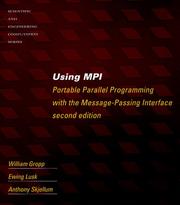| Listing 1 - 3 of 3 |
Sort by
|
Periodical
Abstract | Keywords | Export | Availability | Bookmark
 Loading...
Loading...Choose an application
- Reference Manager
- EndNote
- RefWorks (Direct export to RefWorks)
Electronic data processing --- Electronic digital computers --- Automatic Data Processing --- Documentation --- Information Systems --- Linguistics --- Periodicals --- Parallel programming (Computer science) --- Parallel processing (Electronic computers) --- Programmation parallèle (Informatique) --- Parallélisme (Informatique) --- Computer programming
Book
ISBN: 9780128014141 0128014148 0128016493 Year: 2015 Publisher: Amsterdam, [Netherlands] : Morgan Kaufman,
Abstract | Keywords | Export | Availability | Bookmark
 Loading...
Loading...Choose an application
- Reference Manager
- EndNote
- RefWorks (Direct export to RefWorks)
Heterogeneous Computing with OpenCL 2.0 teaches OpenCL and parallel programming for complex systems that may include a variety of device architectures: multi-core CPUs, GPUs, and fully-integrated Accelerated Processing Units (APUs). This fully-revised edition includes the latest enhancements in OpenCL 2.0 including: • Shared virtual memory to increase programming flexibility and reduce data transfers that consume resources • Dynamic parallelism which reduces processor load and avoids bottlenecks • Improved imaging support and integration with OpenGL Designed to work on multiple platforms, OpenCL will help you more effectively program for a heterogeneous future. Written by leaders in the parallel computing and OpenCL communities, this book explores memory spaces, optimization techniques, extensions, debugging and profiling. Multiple case studies and examples illustrate high-performance algorithms, distributing work across heterogeneous systems, embedded domain-specific languages, and will give you hands-on OpenCL experience to address a range of fundamental parallel algorithms. Updated content to cover the latest developments in OpenCL 2.0, including improvements in memory handling, parallelism, and imaging support Explanations of principles and strategies to learn parallel programming with OpenCL, from understanding the abstraction models to thoroughly testing and debugging complete applications Example code covering image analytics, web plugins, particle simulations, video editing, performance optimization, and more
Parallel programming (Computer science) --- OpenCL (Computer program language) --- Programmation parallèle (Informatique) --- OpenCL (Langage de programmation) --- Heterogeneous computing. --- OpenCL (Computer program language). --- Parallel programming (Computer science). --- Programmation parallèle (Informatique) --- Open CL (Computer program language) --- Open Computing Language (Computer program language) --- Programming languages (Electronic computers) --- Computer programming --- Parallel processing (Electronic computers)

ISBN: 9780262571326 0262571323 9780262571333 9780262571340 026257134X 0262571331 9780262256285 0585173834 9780585173832 0262256282 1282096346 9780262311113 0262311119 9781282096349 Year: 1999 Publisher: Cambridge (MA) London : MIT Press,
Abstract | Keywords | Export | Availability | Bookmark
 Loading...
Loading...Choose an application
- Reference Manager
- EndNote
- RefWorks (Direct export to RefWorks)
The Message Passing Interface (MPI) specification is widely used for solving significant scientific and engineering problems on parallel computers. There exist more than a dozen implementations on computer platforms ranging from IBM SP-2 supercomputers to clusters of PCs running Windows NT or Linux ("Beowulf" machines). The initial MPI Standard document, MPI-1, was recently updated by the MPI Forum. The new version, MPI-2, contains both significant enhancements to the existing MPI core and new features.Using MPI is a completely up-to-date version of the authors' 1994 introduction to the core functions of MPI. It adds material on the new C++ and Fortran 90 bindings for MPI throughout the book. It contains greater discussion of datatype extents, the most frequently misunderstood feature of MPI-1, as well as material on the new extensions to basic MPI functionality added by the MPI-2 Forum in the area of MPI datatypes and collective operations.Using MPI-2 covers the new extensions to basic MPI. These include parallel I/O, remote memory access operations, and dynamic process management. The volume also includes material on tuning MPI applications for high performance on modern MPI implementations.
Computer interfaces. --- Parallel computers --- Parallel programming (Computer science). --- Programming. --- -Computer interfaces --- 005.275 --- Interfaces, Computer --- Interface circuits --- 681.3*D13 --- Computer interfaces --- -Parallel programming (Computer science) --- 681.3*D13 Concurrent programming --- Concurrent programming --- interfaces --- Programmation parallèle (Informatique) --- Ordinateurs parallèles --- Programmation --- Interfaces --- Programming --- 519.68 --- Parallel programming (Computer science) --- Electronic digital computers --- Computer programming --- Parallel processing (Electronic computers) --- Computer input-output equipment --- 519.68 Computer programming --- Computer architecture. Operating systems --- Ordinateurs --- Parallel computers - Programming.
| Listing 1 - 3 of 3 |
Sort by
|

 Search
Search Feedback
Feedback About
About Help
Help News
News